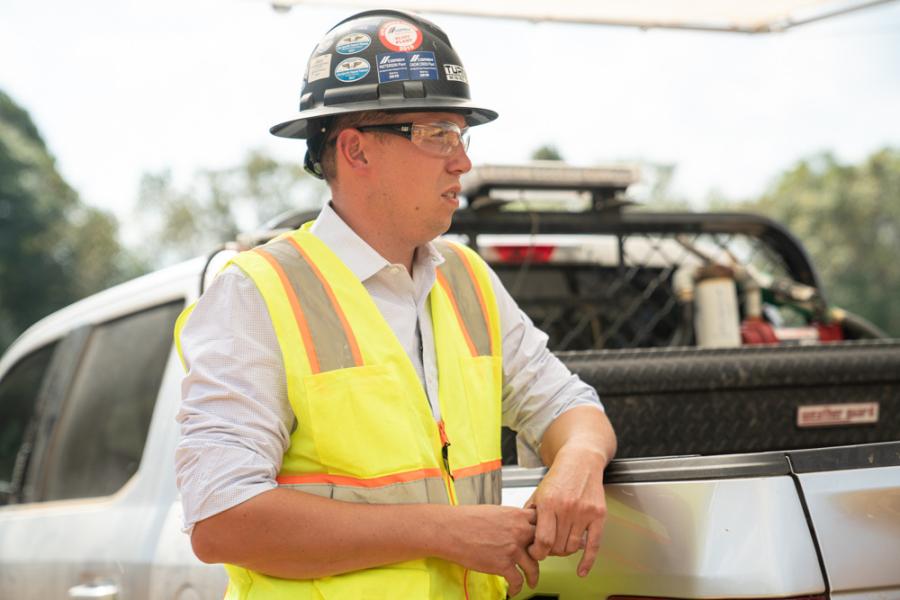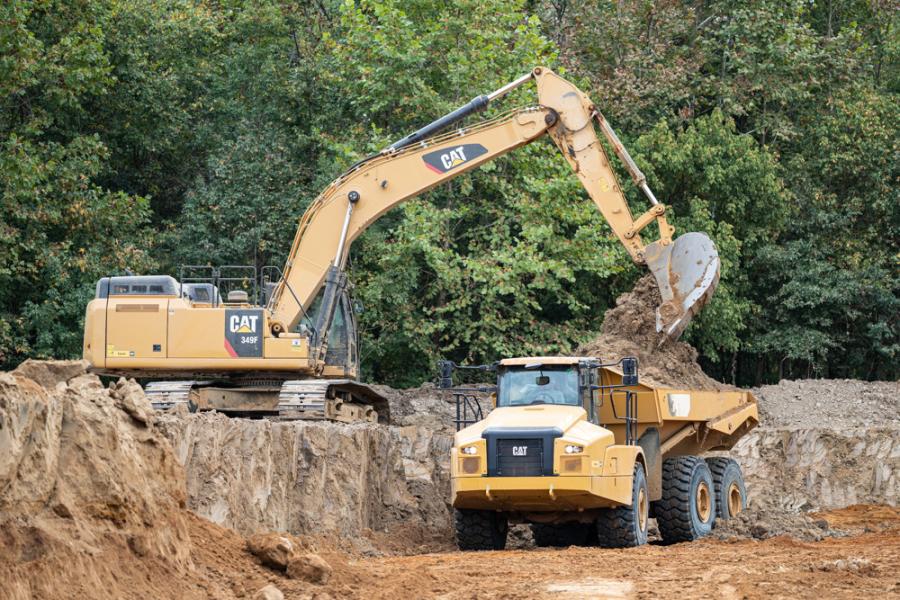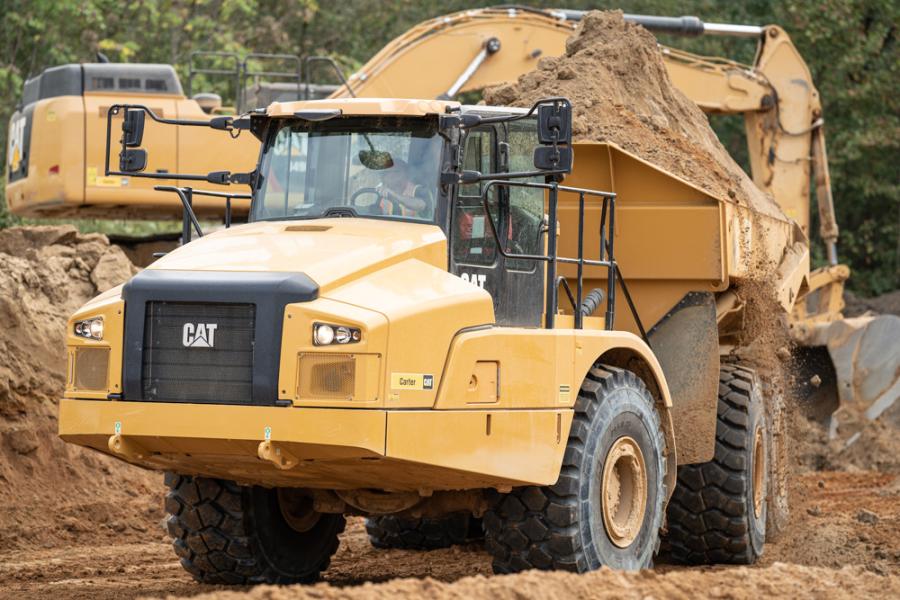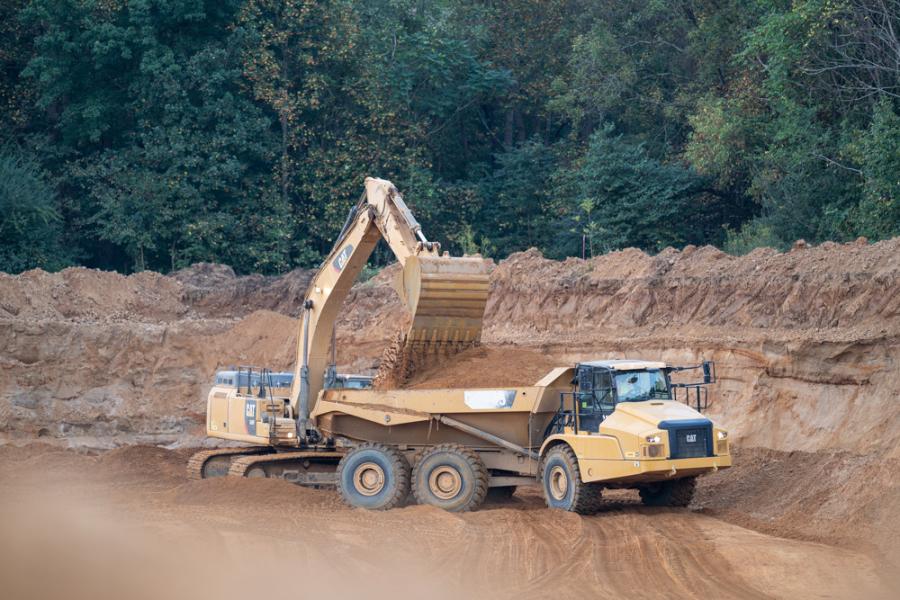Turner Mining Group provides all mining activities from green site startup to final reclamation, although that includes surface mining only.
At the age of 27, Keaton Turner wanted to "make mining sexy again," so he decided to "take a swing" at launching a contract mining company. He said he wants people to know how "awesome" the industry is. "A lot of people think mining is the underground dirty coal mine, but it's just not."

Keaton Turner
The Indiana native with degrees from Indiana State University in construction and business administration worked for his uncle's excavating company for eight to 10 years but didn't think he'd live in "the dirt world." However, he liked traveling and being outside … and he noticed something about the mining industry that suggested an opportunity.
"The mining industry is unique," he said, adding that it's rooted in tradition and has an older workforce. "The average age is 52."
At a recent roundtable, Turner confessed that at age 16, he had no thoughts of getting into the mining industry. "I grew up liking trucks and excavators, but this industry looks scary from an outsider's perspective. It looks old."
Realizing that the bulk of that workforce would be retiring before long, he left the family business. "I saw where the industry was going … and where it really needs to go."
He envisioned creating a professional service to fill the gap — but he put a revolutionary spin on it, leading a new wave of young entrepreneurs destined to change the way things are done.
Contract Mining
Borrowing from Amazon's contractor-based model, Turner set out on his mission to make life better for the industry by establishing a nationwide company of miners outsourced to individual sites on an as-needed basis. This format empowers mine owners to optimize production as their needs and resources fluctuate.
Contract mining is more common in Australia, South America and other remote areas where it's hard to get a workforce in.
"Mining companies own mines or the rights to extract the material," Turner said, "but some of them don't want to fly people in and out."
There are few mom-and-pop companies, he said, and even the big companies may have a lot of quarries scattered across state lines, making scaling difficult.
"Mom-and-pops buy equipment and work in a given area, but moving a D8 to another state is expensive."
Add to that, the local workforce usually doesn't want to work far from home.
"A couple of U.S. companies are doing it, but it's not their main income," he said, adding that "big infrastructure companies — heavy highway — dabble in it," but that no other big company is fully into mining.
Turner became the driving force for change when he founded his company in March 2017. "We want to change the game, change the stigma."
Game Changer
When Turner started his company, he relied on mining experience and a vision of what the future of mining could be. Believing in a need for a coast-to-coast contract mining operation, he instituted a full-service, people-focused provider, integrating partners who furnish equipment and financing.
Turner Mining Group provides all mining activities from green site startup to final reclamation, although that includes surface mining only: strip mining, open-pit mining and mountaintop removal mining in which the rock and soil overburden on top of mineral deposits are removed. Surface mining is commonly used to extract sand, gravel, stones, aggregates, coal, iron, gold and other metals. Turner does not currently engage in underground mining, which requires shafts and tunnels.
In addition, the company offers a full spectrum of services, including overburden removal, drilling and blasting, crushing and screening and reclamation — either ongoing to keep a site clean or final service to restore the earth to permitting specifications. They also offer specialty earthwork services, such as plant site grading, green field development and silt pond management.
Getting his new business started was a tough sell at first, he recalled. "Prospective clients laughed."
It wasn't easy for a new company with a young CEO to get good employees, clients or bank loans … or to convince equipment dealers to send equipment. But, he said, he "relentlessly pursued innovative ways to get the job done."
To scale quickly, he needed a bank partner willing to take risks. "It all hinges on results," he said. For banks, that means a quick ROI and profits. For mine owners, it's safety and being on time and on budget. For employees, it's career potential and upward mobility.
Taking Inventory
Results soon followed. Turner now partners with about 30 dealers to rent and lease equipment, although he acknowledged making some "strategic purchases." It's hard to find big excavators in the rental market, he pointed out. "They're expensive to rent and to move. Most dealers don't want a million-dollar machine on the rental books for long."
When it comes to bulldozers, anything "D8-size" and above, they buy, but they rent a lot of Cat D6s because "they're easy to rent."
Despite acknowledging that price and product features are very similar across the top brands and claiming no brand loyalty, preferring to do business with people, rather than blindly adhere to any brand, Turner said Cat has good resale value, so he buys Cat dozers and excavators.
"We buy the 349 and 374 and run them five years," he said. "Then, we sell to make some money back."
Haul trucks are a necessary evil, Turner grumbled. "They're monsters to maintain. They're always breaking down." He prefers to rent them do the dealer owns and maintains them, but he has purchased some.
Speaking at a roundtable, he reiterated that relationships take precedence over brand.
"I'm not going to walk around ConExpo and look at equipment and all of the new features and products that are going to move dirt in the same way they did two or three years ago. What I really care about is relationships. Who's going to be there when the machine goes down? Because it's going to go down. It's all great equipment, but it's all going to break, so the differentiating factor is the relationship."
Technology
Along with the heavy equipment required to work in mining, Turner integrates the latest technology where applicable. Anticipating being able to operate equipment remotely in a few years, he currently uses GPS technology and has a drone program for volume surveys.
"When you open a new mine, the client pays according to how much material we move. We count truckloads, but we need a better method."
Explaining that some trucks are too big to weigh, which also takes valuable time away from the cycle — an average of 30 seconds each for 300 trucks or more — he said that drones can estimate material amounts within a couple of percentage points by flying over before and after the work. It's cheap and fast, he said.
Smart people keep pace with technology and evolving regulations, he added.
"When you look at where the industry's headed, there's a lot of technology. It will likely change and adjust the labor pool."
Use of technology means the difference between success and failure. "It will squeeze the unprofessional out. Mom-and-pops will struggle to keep up with safety."
Turner said some of the big international companies are already imposing their own safety regulations. His company has implemented safety policies that are tougher than MSHA's and include daily safety audits. "For us, safety is beyond compliance."
Mines are overseen by Mine Safety and Health Administration, which institutes national regulations and typically visits sites twice a year to confirm compliance. In addition to MSHA, each state has additional regulations they must follow.
"California is like a different country," he said, "with air quality measure and other state-mandated rules."
Virginia and West Virginia had so many fatalities in coal mines, they instituted the Department of Mines, Minerals and Energy to oversee mining operations. "Some states are easier to work in than others."
Employees
Two years ago, Turner had seven employees. Today, the number hovers around 300, and continues to go up as he signs new customers. "All of it came from Instagram, Facebook and LinkedIn," he said.
He likes to share what his company does on social media and even participates in podcasts.
"We could do all of the cool stuff behind the scenes and live in the shadows, but I'm going to share the growing pains. There are a whole lot of cool things to share. I don't think we would even be sitting here if we didn't share what we were doing."
He recruits people who are eager to travel and live elsewhere, and he's hired people from all 50 states — of every race, religion and experience level. "We want good human beings first. They can be trained to do the job."
Training is intense and expensive, and consists of a mixture of rigorous onsite, classroom and online education. "It's the tough part," he confessed. "It's easy to get people in the door. It's a little bit harder to train them."
New miners spend an average of four days in training to work at a Part 48 mine. Part 48 includes all underground mines, surface coal mines and some surface metal/non-metal mines. Part 46 designates very specific types of mines. Gold, specialty minerals, aggregates and sand all require different training. "They require site-specific training to deal with traffic, hazards and other things," Turner said.
Recognizing that experienced and knowledgeable workers will be retiring over the next 10 years, Turner likes to mix old and new employees, pairing experienced employees with trainees or other employees on their way up the ladder to transfer knowledge. His first employee was an older man from the Kentucky coal mines. "He was a bit rough, but we taught him how to train employees."
Identifying talented employees eager to move into management roles, Turner often appoints assistant project managers.
"Assistant project managers are project managers in training, getting experience on the job. It helps us scale when we need to. It's hard to steal a manager from one job for another, but an assistant manager can move up to a new project."
Retention also is a challenge. It may be the equipment showcased on Turner Mining's social media that draws attention, but the young entrepreneur promises images of people getting their hands dirty.
"[Our people] are the ones who are doing the work and getting up at 4 a.m. We try to show them off to the industry and their peers. There are a lot of young people who [appreciate] a shout-out on Instagram, so that's what we try to do. We really want to make the people the heroes of our story."
Job Duties
Training is crucial for safety reasons and productivity, but it's also critical for employee career paths because Turner believes in letting the "best players play, no matter how much experience they have."
He doesn't keep a seniority list. There is no waiting line. His operating manager is just 26 years old, in an industry where most are 45. Passion, hard work, talent and results are rewarded.
He's not afraid to move people around, either.
"I put people in positions to do what they're good at," Turner said, explaining that he recently moved people around to better use their skills — or to put them where they're needed. In the mountains of upstate New York, the season runs April to September. After that, the crew moves to Texas or Florida for the winter.
Job length ranges from three months to five years. Turner said there are even some 10-year contracts out there. Three-month seasonal routine jobs recur annually. While these short jobs can be harder than long contracts due to the brevity of time, he views them as opportunities to showcase the company's ability.
After three years, there are still hard lessons.
"My biggest lessons are people — not equipment, material or deadlines," Turner said.
Sometimes he has to remove an employee from a site where they are not needed. For example, on a "simple project" involving a three-year contract to mine sand — "no drilling or blasting; easy digging" — he put the wrong person in charge. The man overseeing the work had a management style that was so hands-off, Turner said there was almost no management at all. Deadlines were missed, which had financial consequences. He took charge of the situation and replaced him to save the project.
He applies the same standards to himself. Considering himself "a sales guy," the boss has a passion for hunting for new clients and business opportunities, but he recently hired someone to take on that role in order to free himself up for strategic planning. "Passions change," he shrugged. "I love being on site and interacting with our people, but I've had to shift from day-to-day operations to future vision. What are the threats to the business? What do we need to be doing? Where should we be?"
Ultimately, he said, Turner Mining is a people company that moves dirt, not a mining company. "My goals are not financial; they're people goals. If we lose track of people, we lose track of the company. Life is short, I want to impact as many people as I can."
He hopes to grow his company enough to support 1,000 employees. Fortunately, because mining is considered an essential business, there have been no work stoppages this year. In fact, he said, "business is booming." After all, he added, "if it's not farmed, it's mined."
Meanwhile, Turner will continue pushing boundaries and applying integrity and ingenuity to make mining more efficient, safer, more lucrative and … sexy. CEG
Today's top stories

























